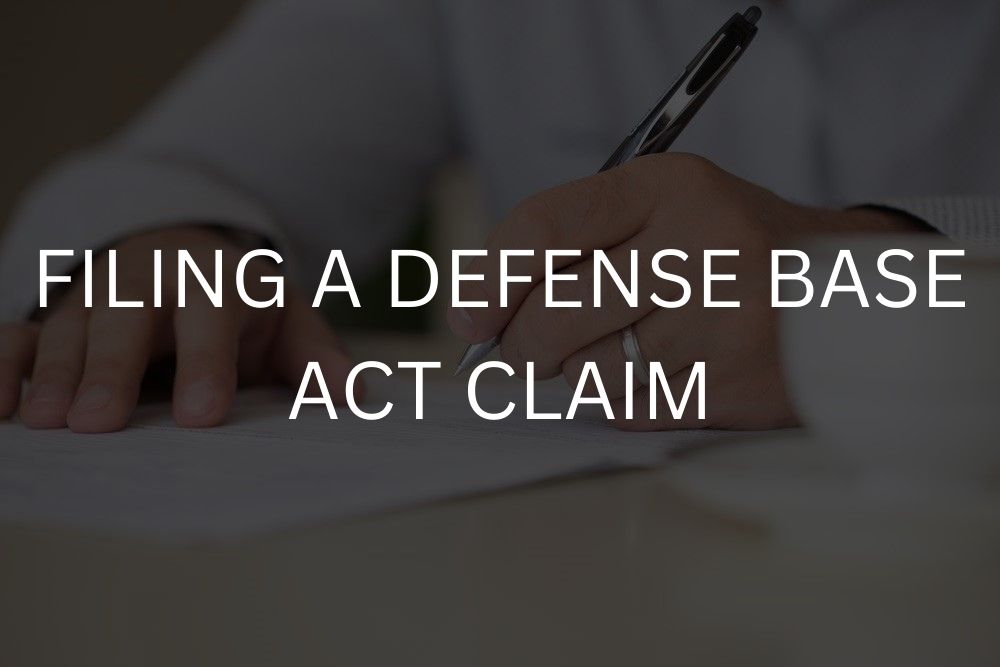
The Defense Base Act (DBA) provides protection to civilian employees working overseas for military support. This federal law requires all federal contractors to have DBA insurance in place of state workers' compensation if a worker sustains injuries while performing their duties on military property or base.
This federal law might be applicable to you if you own a business or work for one under the federal government. Since the DBA is a complicated law, consulting a defense base act lawyer in California is wise.
The Law Office of Andrea R. Herman has a team of legal specialists with extensive experience in the Workers' compensation act in Los Angeles, CA. We can help you file a claim or appeal based on your situation. However, it is essential to thoroughly understand the DBA before filing a claim.
The Defense Base Act is applicable to all government subcontractors and contractors with overseas employees. This act places the Longshore and Harbor Workers’ Compensation Act (LHWCA) provisions in effect for the employees with certain exceptions. This compensation law was introduced in 1941 and was supplemented by War Hazards Compensation Act in 1942. It was further amended in 1953 and 1958 to enhance its coverage.
All the employees who have sustained injuries and qualify for this act are provided compensation for their injuries and sufferings. There are multiple kinds of compensation offered, particularly medical and disability benefits.
In case of the employee's death due to the injuries sustained, compensation is provided to the dependent of the deceased employee. The dependents usually include the children, siblings, parents, and spouse of the deceased worker.
The workers eligible to attain compensation under the Defense Base Act must be performing the following activities for the employer:
Severe penalties are applicable for contractors and firms that must have a DBA but neglects to do so.
Every government contract includes a provision requiring the contractors to have DBA insurance. Those who fail to abide by this provision are faced with hefty fines and might end up losing the contract. Under common law, the additional severe penalty for neglecting to have a DBA is that the employers are subjected to suits. This means that all the claimants must fill the suit without needing to prove negligence.

In case you sustain injuries while performing duties for the federal contractor, you must immediately report the injuries. It is essential to get immediate treatment for the injuries. Your employer should file the first report of injury form within ten days of sustained injuries. The insurance company of the employer will provide the medical treatment cost and the necessary compensation if you are eligible under the DBA.
If your employer does not provide DBA coverage, a workers’ compensation lawyer can help you file the case in the US Court of Appeals or the US District Court. In case your loved one sustained severe injuries or passed away as a result of injuries sustained while working for a contracting DBA company, you can file a case to claim compensation.
The DBA coverage is under the Department of Labor regulation. It offers coverage that is like workers' compensation. There are multiple areas of compensation covered under DBA, including:
If an employer fails to offer the DBA compensation or insurance as stated by the DBA, they can face civil lawsuits, criminal prosecution, heft penalties, and loss of contracts. These laws are complicated, and multiple companies and even employees working for subcontractors or contractors are unsure or unaware they might be protected under DBA.
A DBA lawyer can assist you in gathering the relevant evidence and documentation, investigating the case, meeting deadlines, negotiating settlements, and filing the case on your behalf. It is essential to act fast and file the claim to get the right compensation you deserve for the injuries and sufferings you endured. Get in touch with the Law Office of Andrea R. Herman in California for an initial consultation of your case and determine the next steps.
DBA cases follow Longshore vocational rehabilitation rules. The stated objective is to help permanently disabled workers return to gainful employment suited to their restrictions through reevaluation, retraining, or job placement assistance. If you cannot return to your overseas role, vocational rehab can become a key part of documenting work capacity, wage-earning ability, and appropriate reemployment options. You can also request assistance from the program in accessing vocational rehabilitation services as part of claim administration.
The Defense Base Act generally gives injured workers up to one year from the date of injury—or the last payment of compensation—to file a claim. However, notifying your employer within 30 days is crucial to preserve your rights. Filing deadlines can be tricky, especially with overseas assignments, so it's wise to consult a knowledgeable Defense Base Act attorney in Long Beach, California as soon as possible to avoid missing key deadlines.
Absolutely. Psychological conditions such as PTSD, anxiety, and depression that result from working in high-stress or combat-adjacent environments abroad are covered under the Defense Base Act. These claims can be complex and require strong documentation and legal advocacy. Our workers' compensation attorneys in Long Beach have experience handling these sensitive cases and work diligently to secure compensation for mental health injuries.
Yes, the Defense Base Act generally covers U.S. citizens and residents, host country nationals, and third country nationals who work on qualifying U.S. government contracts overseas. The law requires contractors to secure DBA coverage for all such employees who meet the Act’s criteria. Coverage is tied to the nature of the contract and the employment activity, not just citizenship. Eligibility details and examples are outlined by the U.S. Department of Labor’s Longshore program. If you are working under a U.S. contract on or near a base or public works project, you should be within the Act’s scope. When in doubt, ask the carrier or DOL to confirm your status.
You should give written notice of injury to your employer within 30 days using Form LS-201 where possible. For medical treatment, you can request an LS-1 authorization to treat with a doctor of your choice. To claim compensation, file Form LS-203 generally within one year of the injury or of the last payment of compensation if any was made voluntarily. Occupational disease and hearing loss claims may have additional timing rules. Filing and notice deadlines are administered by the U.S. Department of Labor’s Longshore program. Keep copies of all submissions and confirmations from the SEAPortal or mail.
If your injury stems from a war-risk hazard while covered by the DBA, your employer’s insurer can seek reimbursement from the federal government under the War Hazards Compensation Act. This reimbursement process does not reduce your DBA entitlement and is handled between the insurer and the government. The Department of Labor sets the rules and forms for reimbursement under the WHCA. Regulations for claims and reimbursement are in 20 CFR Part 61, and DOL publishes WHCA program information and forms. Understanding this interaction helps explain why carriers may request specific documentation about the cause of injury. Your benefits flow through DBA, while WHCA sits in the background to repay the carrier for qualifying war-risk losses.
Yes, under the Longshore system that the DBA uses, you are generally entitled to select a physician of your choice to treat a work injury. To start treatment, ask your employer or its insurer for Form LS-1 so your chosen doctor is authorized, and remember emergencies can be treated first with authorization obtained afterward. Keep copies of your LS-1 and any appointment confirmations in case there is a dispute later. Carriers may still schedule their own medical examinations, and you must attend reasonable exams or risk suspension of compensation. If you need to change physicians, coordinate the switch consistent with Longshore procedures and guidance. These rules flow from the DOL Longshore program resources, which also apply to DBA claims.
Compensation is based on your Average Weekly Wage calculated under Section 10 of the Longshore Act, which looks to your actual earnings or comparable wages and converts them to a weekly figure. Depending on your work pattern, the statute provides different methods for calculating annual earnings that are then divided by 52. Your weekly benefit is typically two thirds of the AWW, subject to statutory maximums and minimums. The DOL publishes updated National Average Weekly Wage tables each October that set those caps and floors used for DBA cases. Documentation of base pay, overtime, differentials, and contract earnings is critical for an accurate AWW. See the governing statute and DOL references for the formulas and current limits.
Employers are required to secure coverage, and failing to do so can trigger criminal penalties including fines and potential imprisonment. If a company is uninsured, it remains directly liable for benefits and key corporate officers can face personal liability under federal law. In some situations where both the employer and its carrier are insolvent or out of business, the DOL Special Fund may pay compensation and medical benefits. You still file and pursue your DBA claim, and the DOL will route payment responsibility under the statute. The federal acquisition rules also require government contractors to maintain DBA coverage before performance. These safeguards exist to prevent coverage gaps and to protect injured workers and their families.
A denied DBA claim doesn’t mean the end of your case. An experienced workers' compensation attorney can investigate why your claim was denied, gather additional evidence, and represent you through appeals and hearings. At our Long Beach office, we’re deeply committed to defending the rights of injured workers and contractors. If your claim was denied or underpaid, reach out to us to take the next steps toward justice and fair compensation.

© 2026 Law Office of Andrea R. Herman, PC | All Rights Reserved | Privacy Policy | Terms & Conditions